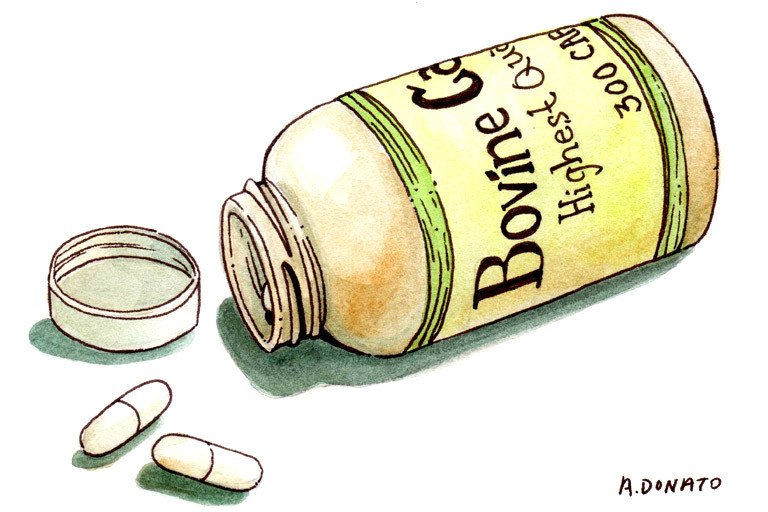
Common Names
- Bovine tracheal cartilage (BTC)
For Patients & Caregivers
Tell your healthcare providers about any dietary supplements you’re taking, such as herbs, vitamins, minerals, and natural or home remedies. This will help them manage your care and keep you safe.
Evidence is lacking to support the use of bovine cartilage to treat cancer or AIDS.
The use of cartilage products for treating cancer partially stems from the theory that since cartilage does not contain blood vessels, it must contain substances that would prevent the growth of blood vessels around tumors, a process known as angiogenesis. Catrix®, a bovine cartilage product, was used in a lab experiment against isolated samples of several cancer cell lines, with positive results at high doses. However, there is still little evidence that these effects can occur in the human body.
Because bovine cartilage supplements may contain the same specialized proteins that make up human cartilage, they might assist with the resynthesis of cartilage in people with osteoarthritis. It has also been suggested that bovine cartilage may enhance immune response, but this effect has not been shown in humans.
Bovine cartilage should not be confused with shark cartilage.
- To reduce swelling from arthritis
Evidence is lacking to support this claim. - To prevent or treat cancer
Small studies suggest that bovine cartilage may have anticancer effects, but larger studies have not been conducted. - To treat AIDS
Evidence is lacking to support this claim. - To stimulate the immune system
Evidence is lacking to support this claim.
- Altered sense of taste
- Fatigue
- Upset stomach
- Fever
- Dizziness
- Swelling of the scrotum
- When injected, swelling and redness at the injection site
For Healthcare Professionals
Bovine cartilage is usually derived from the trachea of cows. It is used to prevent or treat cancer and AIDS, and is available in supplemental forms for oral or parenteral use. In vitro studies suggest that bovine cartilage may have antitumor and immunomodulatory effects (2) (3) (6). Preliminary clinical findings suggest that it may have anticancer properties (4) (5). Larger studies have yet to be conducted.
Reported adverse effects include changes in taste perception, fatigue, dizziness, and dyspepsia. Inflammation and irritation at injection sites are common following parenteral administration (3) (4) (5).
Bovine cartilage should not be confused with shark cartilage.
- Arthritis
- Cancer
- HIV, AIDS
- Immune stimulant
Immunomodulatory effects are believed to enhance antibody responses to T-independent and T-dependent antigens, indicating that the activity of bovine cartilage is due in part to a direct effect on B cells or an indirect effect mediated by macrophages. Bovine caritlage is also believed to support the resynthesis of cartilage in osteoarthritis (2).